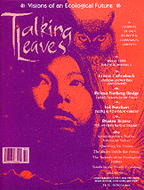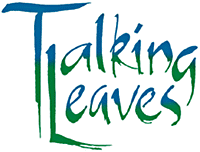

There is a Zen story about a man who set himself the task of digging a tunnel through the solid rock of a mountain to provide travelers with an alternative to a treacherous cliffside path. He worked to serve penance for his misdeeds, and it took him fifty years to complete the tunnel. At the time I read the story, I felt jealous of the man. Though his task was difficult, the value of its objective was clear and the rest of his life was clarified by his single vision of what he would work to accomplish. His story stirred the craving in me for a clarity of purpose that would be worthy of fifty years of my life to pursue, a vision of what unique contribution I could make.
A few years later, a friend from El Salvador was telling me of his motivation to return to his people in that country with his skills as an agriculturist. His people badly needed what he had to offer in rebuilding the country after years of civil strife. The question came into my heart, "Who are my people?" I didn't feel that I had any people, yet I really wanted to have people who could be my people, because I wanted to offer my skills to them. After some time reflecting on the question, I realized that all people living in the United States are my people, as much as I really had any people at all.
It was sad to me, because I felt that Americans did not really want me. There are so many people in the US and I was just supposed to take care of myself, find a job and a wife, move around every few years, have babies, and, if I was really civic minded, volunteer at some agency on occasion. Besides, going to a foreign country and offering my skills there seemed much more glamorous somehow, more useful and important. After more thinking, though, I realized that people in the US really do need me; as influential as the behavior and thinking of US citizens are on the rest of the world, any contribution I could make here was extraordinarily important. However, I still didn't know what I could do and the list of options seemed overwhelming.
In October of 1997, I went on a Vision Quest (see below). Thirty-five years old, I had never really acknowledged that I was an adult. I had become a husband and a step-father in September. I had sacrificed the childhood need for security and approval to take the steps toward my personal goals and a life that represented my values. I had earned the right to call myself a man. I went on the Vision Quest to confirm this as so, to tell the universe that I was ready in all ways to be a man and leave the child in me behind. I went out to commit to my roles as husband and father, so that when times were difficult I would act from my commitments and not from my distress. On the fourth night of the fast, I stayed up all night in my purpose circle, praying for a vision. I received one. I was told it is my role to help all of my people to love. That by loving, we heal the relationship between the Great Creator and his woman, who have been separated. The message was direct and clear--if I was committed to the path of spirit and wished to find my place alongside the Great Creator, I would allow the energy to flow through me and to heal others. My challenges in this would be self-doubt and a tendency to conceal my weaknesses from others. Knowing my vision has changed my life. I am making my vision real in the world by facilitating Vision Quest trips to the wilderness, teaching apprenticeships, and honoring my commitments. My relationship with my wife and my community keeps me honest and grounded so the power to heal doesn't go to my head.
My vision of the future includes a society of people who acknowledge the importance of rites of passage, seeing them as bridges between the birth, adolescence, maturity, and death of our kind. In my vision, adolescent men and women each are mentored into their unique and essential role in society by elders who have displayed wisdom in their own journey, and adults have full access to their mature roles as protectors of children and participants in community. In this future time each individual will know fully that they are wanted, needed, and appreciated for the unique gifts that they alone can contribute to their people.
Making this vision real is good work. I am grateful to have this work that will easily absorb fifty years of my effort, and is worthy of the time. I have my challenges to face, and they require me to be as big as I am. Perhaps you too feel the craving for a vision that encompasses a lifetime of work, and when you take your place, we will work side by side, serving our people and creating the future.
Charles Tilt has facilitated Vision Quest experiences at Lost Valley Educational Center.
Many traditional and ancient cultures recognize the need for rites of passage. Particularly important to the health of a society is the transition from adolescent to mature contributing adult. There are three principle components of the transition.
First is letting go of the past and severing oneself from what has come before (symbolic death).
Second is symbolically leaving the physical world, moving into a liminal state and encompassing the spiritual nature of the universe in which it is understood that we each have a unique purpose on earth and can become aware of that purpose and commit to achieving it. (In achieving this liminal state, we observe the taboos of no food, no company, and minimal shelter, usually for three or four days.)
And finally, returning to our lives and doing the work of making the vision real, for a vision that is not fulfilled has no power.
The ceremony is most powerful and effective for the individual if they return to a society that is willing to expect them to act out their new role as adult, and confer commensurate responsibilities and trust that are associated with their unique gift.
�1998 Talking Leaves
Winter 1999
Volume 8, Number 3
Visions of an Ecological Future
We welcome your letters!
For a sample copy of the Winter 1999 issue, "Visions of an Ecological Future," send $6 to
